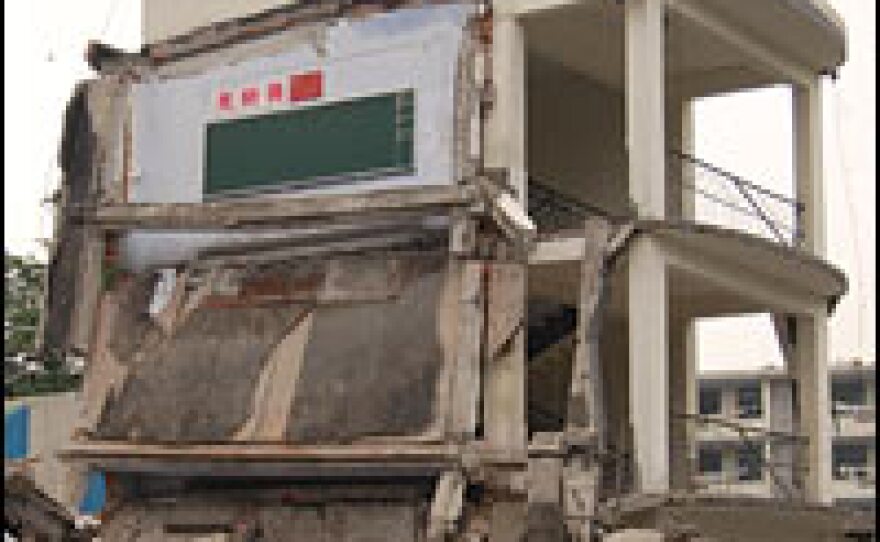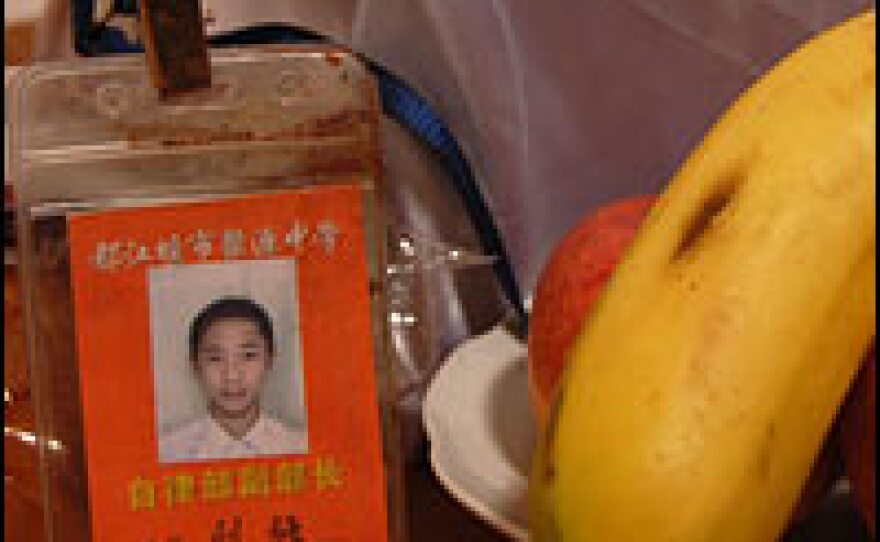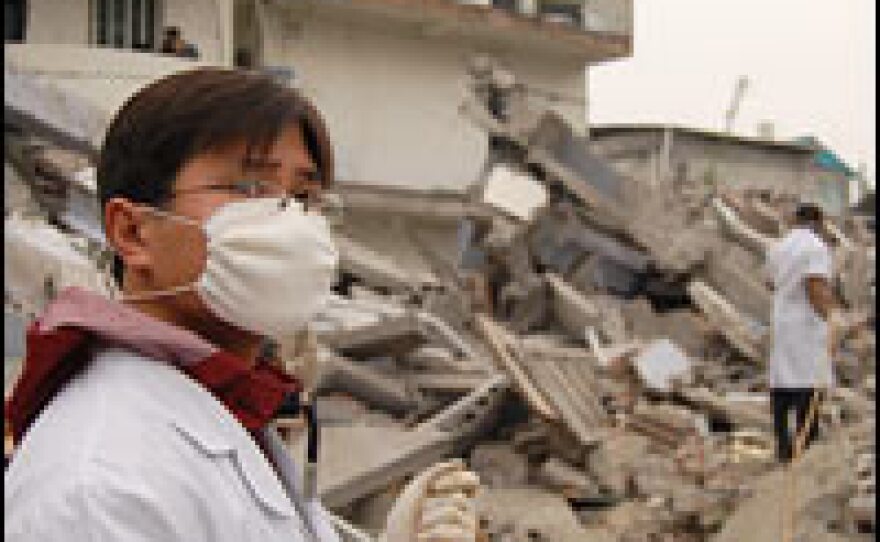



The earthquake earlier this week in Southwestern China caused the collapse of a middle school that trapped hundreds of students. The school, just outside the city of Dujiangyan, was expanded from two stories to four, which may have contributed to its collapse. Town residents think some of the blame goes to local officials, who they say are corrupt.
All but the Juyuan Middle School's staircase collapsed. The seven cranes that were working late into the night Monday to lift heavy debris are gone now. The rescue effort has shut down. Hundreds of children's bodies have been taken away.
Health care workers are spraying the rubble with disinfectant. They're concerned about the spread of disease from bodies still trapped under the rubble.
Wang Suhua stood watching a bulldozer clear away plastic sheeting and debris from the muddy field where the students' bodies had been taken — among them, her 17-year-old granddaughter, Yang Miao, who was killed in her classroom. When the rescue workers pulled her out, she was still holding her pen.
"This building was originally designed to be two floors," Wang says. "They turned it into four floors. I went there several times for parents' meetings. You could feel the building shake."
The anger of villagers like Wang Ming starts to boil over as they talk about shoddy construction. He says the building was poorly constructed and that the person in charge of quality control for the construction took bribes.
A man shows a piece of cement from what he says was a pillar. He breaks it in half to show how soft it was — how unable it was to withstand the force of the earthquake.
Other residents say the local education bureau knew the school was dangerous and had allocated money for it to be torn down and rebuilt. But locals say instead the building was renovated and given a coat of whitewash.
Residents complain about corrupt local officials, who do things for show and don't care about the people.
On the side of the school building sheared away by the earthquake is a green blackboard. Above it, in red Chinese characters, is a sign that reads: "Nothing to fear."
A few miles away, down a narrow dirt road in the village of Long Quan, are boys who were inside the school when it collapsed.
Fifteen-year-old Huang Zhihui was in history class at 2:30 p.m. Monday, when the school suddenly started to shake violently.
"I was very scared," Huang says. "I've never been through an earthquake before. I didn't know what was going on."
He ran from his classroom, down a stairwell and outside.
"I heard screaming," he says. "And when I got outside, I heard the sound of the building collapsing. Most of the students were still inside. Only a minority came out."
His friend Wei Bo, also 15, is one of those who stayed inside. He says the teachers didn't realize how serious the earthquake was. His politics teacher told the students to stay in their chairs and calm down.
When the shaking stopped, Wei found himself in an air pocket, covered with rubble.
He was trapped for 20 minutes, then managed to pull himself out, and he helped a friend climb out, too.
"When I saw the building in ruins, I felt heartbroken," Wei says. "I saw students come out, their whole bodies covered with blood. I couldn't look anymore."
It took four to five hours for the rescue workers to arrive, he says. The parents were there first, desperately trying to find their children.
"When my parents got to the school, they were so anxious because they didn't see me," Wei says. "But I had already come out. When they saw me, they cried."
Many parents, though, weren't so lucky. A woman hands a reporter a picture of a young boy who was killed in the school. It's his school ID.
Liu Qiang was 17. His father, Liu Sheng Lu, rushed to the school right after the earthquake and started digging. He was able to rescue four students — but not his son.
The father waited for days, watching soldiers pull out bodies, waiting to see if his son was among the dead. On Wednesday afternoon, two days after the earthquake, his son's body was recovered. It was among the last group to be removed from the debris pile.
The family has set up a makeshift altar inside their home. They have lit red candles and filled a bowl with a banana and three apples. And they've included Liu Qiang's ID card from the school where he died.
The boy was cremated Wednesday. Crematoria in the neighboring city of Dujiangyan are completely full, so the father drove more than an hour to the provincial capital, Chengdu. Liu Qiang's ashes lie in a cremation box on the altar, wrapped in a white silk scarf, waiting for burial.
Copyright 2022 NPR. To see more, visit https://www.npr.org. 9(MDAzMjM2NDYzMDEyMzc1Njk5NjAxNzY3OQ001))







